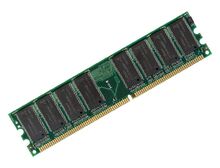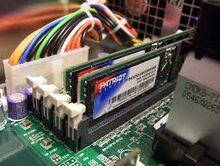
RAM, or Random Access Memory, is the part of a computer that holds the computer's memory. It has random memory, so the bits that are stored in the card are random, and therefore easier to find a specifc oemsection of bits, or a specific piece of data. Other types of memory storage is in a computer, the [Disk_Drive_2014|hard drive], or the [Drive_2014|optical drive], for example read and write data. These cannot acces it randomly, but have to sort though all of their information in order to select the right data. This is why it is handy to have the RAM for easy to access information that the computer is using at that time.
How It Works[]
RAM stores it's memory in bits, arranged in rows. One column of the grid is called bitlines, and the other is wordlines. The dot on the grid where a bitline and a wordline intersect is a memory bit’s ‘address.’ The RAM is read this way: a charge is sent through a column of bits, and depending upon the amount of charge a bit has it will be read as either a 1 or a 0. Circuits run from the RAM to the [2014|motherboard] and the rest of the computer to support this system. They tell when a column should be fired with a charge, see which column should be fired, and they perform many other tasks that keep the RAM going.

History[]
Before computers had RAM, they had something called a Vacuum Tube, and after that Transistors. Each Transistor could hold one bit of data, or a 0 or 1. Vacuum Tubes could hold the same amount, a bit, but they did the job very differently and they were much bigger. Vacuum Tubes had rings inside and a bit was stored on each ring by magnetizing it. With the invention of Transistors in the 70's people began to be able to store much more data in a much smaller amount of space. From the 70's on, RAM got smaller and faster and was able to hold more and more data.

Sources[]
http://wccftech.com/history-ram-trip-memory-lane/